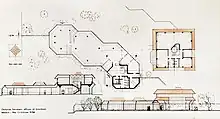Rex Critchlow
Rex Critchlow (1936–2010) was an architect and industrial designer based in Lincolnshire
Rex Critchlow DA RIBA | |
|---|---|
| Born | |
| Burial place | St Helen's, Barnoldby le Beck |
| Education | Worksop College Sheffield University |
| Occupation | Architect |
| Spouse | Jenifer Critchlow (married 1960-2010) |
| Children | 2 |
| Parent |
|
Life and career
Born in Southampton the third son of William Critchlow, an Esso Oil executive, and Emily (née Leach), Critchlow was educated at Grosvenor House School in Harrogate, Worksop College and the University of Sheffield. After work in London for various practices including Eric Lyons, Critchlow moved to Lincolnshire in 1962 and joined JFPye to form Pye & Partners (subsequently Pye Critchlow Architects) where he practised until 2010. Mickling Barf[1] a house designed by Rex and Jenifer Critchlow for their own occupation was Grade II listed in March 2023.[2] The house was designed and constructed concurrently with Turn End in Haddenham, Buckinghamshire by the architect Peter Aldington (b.1933) as a family home and the couples became friends with both houses showing clear inspiration from the American architect Frank Lloyd Wright (1867-1959) and Finnish architect Alvar Aalto (1898-1976).
Architectural works

- Offices and Canteen building at Easton,[3] near Grantham for Christian Salvesen (1973–74)
- Witham Hall,[4] Witham-on-the-Hill – stable block conversion to music school
- St Peter's Court, High St, Barton-upon-Humber (1981) – Civic Trust award for infill housing[5]
- Haven Mill, Grimsby – restoration & conversion of 5 storey Victorian mill to shops and restaurant with new footbridge over River Freshney
- Own house Mickling Barf[1] at Barnoldby le Beck (1962–65)[6]was listed Grade II in 2023[2]
- House for Brian Clark, playwright in Derbyshire
- House for author and journalist Philip Oakes & Gilly Hodson at North Owersby
Industrial design
Mould-formed GRP bathroom pod, patented design acquired by Ideal Standard (1971)
References
- "The Modern House sales particulars and photographs". 2022.
- "Historic England Official List". 30 March 2023.
- Pevsner, Nikolaus (1989). Buildings of England: Lincolnshire (2nd ed.). Penguin Books. 1989. p. 266. ISBN 0140710272.
- Pevsner, Nikolaus (1989). The Buildings of England: Lincolnshire. Second Edition. Penguin Books. p. 808. ISBN 0140710272.
- "UK Modern House directory".
- "Ideal Home". Ideal Home Magazine: 10–13. November 1982.